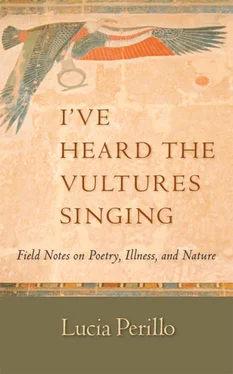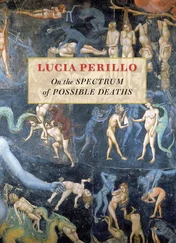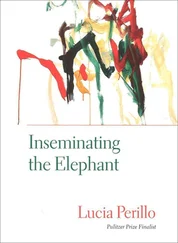This is the problem with the knowledge game. What with all my questing and all my fretting, it’s hard for me to linger in the beauty of the song. John Keats does linger, and at first his listening sinks his mood, because mortality is what the song of the nightingale reminds him of, particularly the idea of a pain-free, easy death.
This would be a logical obsession for someone who’d just seen his brother die from tuberculosis, especially someone showing signs of the disease himself. In the painting made by his friend Severn, he’s sitting in the woods at night while he writes the poem. Alarm is what registers most visibly in his white face, which is turned back over his shoulder toward the song, as if it scares him.
“Ode to a Nightingale” ends by addressing memory’s inability to fix the song in place: Fled is that music. Do I wake or sleep? Evanescence, it seems, is a universal quality of birdsong. The expert on the bicycle is an anomaly. And maybe evanescence is a good thing because it forces the brooding to lift. It lets us forget that we ever thought of death.
When I was younger, Keats’s high-flown language had no appeal, but now his central preoccupation is more urgent to me: How do we go on when the body’s breakdown becomes impossible to ignore? The poem makes me remember that the world is full of things that should be paid attention to, even when they’re darkened by the shadow of one’s own mortality, perhaps especially when they fall inside that shadow. Life’s meaning comes from the fierceness of this attention.
From a scientist’s perspective, though, the contrast that Keats sets up — between unchanging birdsong (= the poem itself, the future famous words) and mortal man — is wrong. Birdsong changes: the expert on his bicycle finds a distinct lowering in pitch of the song of one species (the bellbird) in his thirty years of studying it. Nothing escapes transformation, and even the poem will change as its interpretation is ground by the years, as the New Critics are replaced by the postmodernists — and then the post-Beauty-ists, who see in every animal the putrefaction of its carcass and the decay of its song.
But in our small-run, temporary, and mortal-human days, we experience also the phenomenon of coming-into-being. Like: one early morning I hear a strange sound and write:

(whistle made of glass)
and by late morning, as usual, I can’t fathom what I meant. But I see a cedar waxwing on the feeder and another one sitting on a branch in the ravine, and when I play the definitive tape, it turns out that the song of a cedar waxwing sings exactly:

(whistle made of glass)
A few days later I hear a song that sounds like a robin that’s been hit on the head by a baseball bat (see: I’ve learned the robin’s song, a hiccuping doodle I’ve overlooked all my life until this game turned my attention to it), and I see for the first time a black-headed grosbeak on the feeder, a bird that the bird book says sounds “like a drunken robin.”
Then it starts to seem that by listening for their songs I’m causing birds to appear, that this game has the power to pull substance from the air, and I don’t know why it ever made me sad. Delete the fucking from the sunrise, which is always beautiful, even when it’s just the grayness lighting up again.
On the other hand: however irritable I am, I’m not insane. Do I really want to be outside in the damp when I could stay in the laboratory of the bed? Which is where Jim quizzes me as he prepares to leave the house at daybreak, “What’s that?”
Flicker .
And that? Steller’s jay .
That? Willow flycatcher. Fitz-brew fitz-brew .
Now, a Buddhist might argue that as soon as you jump to identify the sound, to give it a name, you’ve jumped away from the sound itself, and maybe this is the reason why the songs lapse from mind so easily — we rush from them too quickly. I’ve sustained my connection to nature by resorting to these games, yet I’m also aware of the paradox: that knowledge games take me out of nature.
And what about the beauty of the song itself, which I know I’ve overlooked in my quest for names? I’m not proud of the fact that I can’t work myself into a state of exaltation when I hear the song of a hermit thrush, which sounds to me like so squirrelly squirrelly . It doesn’t send me into raptures, but on the other hand, it doesn’t fill me with woe, as it did Walt Whitman.
This year, I’ve learned the song. Maybe next year I’ll be able to respond emotionally, once I know the name. Thought first, then feeling. I think, therefore the winter wren .
And to get a perfect score on Jim’s quiz caused me to give my cackling one-ha laugh, because I know he expected to stump me. Desire again, the need to win, since it gives me pleasure — can’t help it — to be in command of anything in the midst of my hermit-thrush-song-style spiraling down.
Jim sides with me when it comes to the ravine: he does not think that wanting to enter it means that I’m grasping desperately for what I can’t have. He thinks that trying to come up with logistical solutions is a means of refusing to surrender. Desire is good; it leads us on. Our happiness should be greedy, should make us want more of it.
Then — action. Since my birthday approaches, he calls one of the Asian gardeners who advertise in the local paper, and Victor Hang (son of Huey, whose name is on the business card) shows up that day, a son with only the subtlest of accents, who seems a bit mystified about our project. But he says, well, sure, if we really want it, for six hundred dollars he can build a trail into the ravine. And though the job is scheduled for the next week, it’s the next morning that a truck shows up, and not with Victor inside, who, come to think of it, seemed too well dressed for manual labor.
Instead he’s sent Juan and Lionel, young Latino guys who attack the ivy with mattocks to unearth downed trees, which they rip with a chainsaw to make steps pegged into place with smaller branches. They find all the materials they need right there in the woods, no trip to the store, working so efficiently that the trail is finished by midafternoon. When Victor returns to claim his check, he speaks in his quiet voice from the bottom of the steps: “Ah, I see — at first I did not understand. But it is like Mount Rainier. All you need is a waterfall.”
I’m studying his wife, a tiny silent beautiful woman who climbs up the trail in flip-flops until she’s at my eye-level, smiling shyly.
By now the migratory birds like the grosbeaks and wax-wings have left for their winter territories farther south, though a few species hang on, continuing to sing (if fitfully, now that their young have fledged).
My turn to descend comes a few days later, and I can’t tell if Jim’s lying when he claims that it’s not hard to carry me down the path. All I’m required to do is not speak until we reach the muddy landing. He’s bought a feeder on a pole and plants it: Happy Birthday. I am forty-seven today, older than I ever thought I’d be. My gift is the trail, the logistical solution, a nod to the refusal for it to be denied. The bottle at the bottom of the ravine turns out to be full of champagne.
We’re sitting fifteen feet below the driveway, but we might as well be in the jungle — the nuthatches veer from our heads just an instant before they fly into our ears. How loudly we can hear the violence with which the air must be beaten in order to achieve the trick of flight. And the ivy is alive in a way I’d not noticed from up top, the leaves twitching and rustling, both from the birds hopping through their open slots and the raindrops that penetrate the canopy of maples.
Читать дальше













![Various - Birds and Nature, Vol. 12 No. 5 [December 1902]](/books/745517/various-birds-and-nature-vol-12-no-5-december-thumb.webp)
![Various - Birds and Nature Vol. 11 No. 2 [February 1902]](/books/745533/various-birds-and-nature-vol-11-no-2-february-1-thumb.webp)